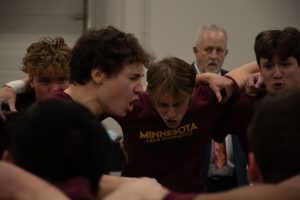The University’s Academic Health Center is reviewing the personnel files of its adjunct professors for possible conflicts of interest.
The inquiry was sparked after Dr. Ilo Leppik, an unpaid adjunct pharmacy professor, was named in a Boston, Mass., federal district whistleblower court case.
Leppik did not return phone calls or e-mails last week.
According to a New York Times article, Leppik was paid $49,250 by pharmaceutical company Warner-Lambert to speak on behalf of an epileptic drug, Neurontin, between 1994 and 1997.
The article also stated the company paid $303,764 to book publisher Parker Davis for printing Dr. Leppik’s epilepsy textbook, which is distributed free of charge to University medical students.
Dr. Richard Bianco, assistant vice president for the University’s regulatory affairs, said Leppik did not technically break any current rules.
“However, this concerns me greatly and we are going to review this,” Bianco said. “We have to be able to trust (adjunct faculty).”
Other University officials defended Leppik and maintained there is no conflict of interest.
“There’s not a strong profit motive here since he doesn’t technically get paid for the book,” said Daniel Feeney, the outgoing chairman of the University Senate Faculty Consultative Committee. The committee is a governing body for faculty at all University campuses.
Fenney said Leppik is free to talk about the drug because his current research and book do not deal specifically with Neurontin.
A former Warner-Lambert employee, Dr. David Franklin, claimed in court his bosses paid dozens of doctors – including at least two others from top medical colleges. The doctors then encouraged other physicians to prescribe the drug for treatments not approved by the Food and Drug Administration, he said.
The illegal practice is also known as “off-label marketing.”
The talks were often held at ritzy resorts and pricy weekend getaways that routinely charged more than $1,000 per person.
On March 20, Leppik lectured on epilepsy drug trials at the Sonesta Beach Resort in Key Biscayne, Fla. On program guides and pamphlets for several similar events, Leppik was incorrectly listed as a University professor.
“It’s very standard that drug companies support higher education and academics to provide that education,” said Marilyn Speedie, dean for the College of Pharmacy. “The adjunct professor brings value to the University without actually paying them so the title is theirs to use.”
“Maybe we should address this if they abuse this privilege, because it’s unfortunate if they do,” Speedie said. “But we know these adjuncts very well and we will not be discontinuing these adjunct relationships.”
Critics of off-label marketing and industry sponsorship of academics say drug corporations funding research and development are trying to influence prescribing decisions. Groups such as the New York City-based nonprofit group No Free Lunch advocate separating scientific research from drug marketing.
Leppik is a primary investigator on a $7 million National Institutes of Health grant to study the effects of antiepileptic drugs among senior citizens. Neurontin does not play a part in the study, which is being conducted at the University.
Leppik resigned from a paid professor position in 1989 and moved into the private sector, founding the Minnesota Comprehensive Epilepsy Program, where he is now director of research.
In March 1999, he told The Minnesota Daily reasons for his departure included changes in the state’s insurance program that caused problems in the school’s organization. He said that made his practice unprofitable and cut into his time for research.
According to news reports, other doctors named in the suit include B.J. Wilder, a former University of Florida neurology professor, who might have been paid more than $300,000 for encouraging Neurontin’s use between 1994 and 1997. Steven Schachter, a Harvard Medical School professor, reportedly received $71,477 from May 1994 through Sept. 1997 for similar duties.
National Institutes of Health representatives said they were not yet ready to comment on the case.
Representatives at both the Florida and Harvard medical schools also said they were not prepared to comment.
According to a database on the Web site of Washington, D.C.-based nonprofit Center for Science in the Public Interest, Warner-Lambert has connections to doctors at other colleges as well. The University of Michigan School of Medicine-Ann Arbor, the University of Pittsburgh School of Medicine, New York University, the University of California-San Diego, Columbia University, the University of Chicago and UCLA either employ or have employed doctors who spoke on behalf of the firm.
Pfizer acquired Warner-Lambert in 2000. Pfizer has maintained in their press releases that any possible wrongdoing concerning Neurontin took place well before the merger, and thus is not their responsibility. Pfizer holds an exclusive patent for Neurontin, which earns the company more than $2 billion in annual revenue, according to www.hoovers.com.
Four separate studies published in the Journal of the American Medical Association between 1990 and 1997 concluded that companies’ drug-marketing efforts can have significant effects on medical faculty.
Nathan Hall covers University research and technology and welcomes comments at [email protected]








